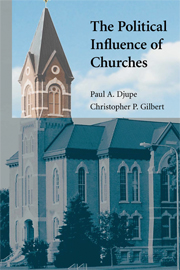Book contents
- Frontmatter
- Contents
- Acknowledgments
- Introduction: A Theory of Religious Influence on Political Behavior
- 1 Social Networks and Church Structure
- 2 Clergy Influences and Religious Commitment Reconsidered
- 3 Church-Centered Influences on Public Opinion
- 4 The Resourceful Believer
- 5 The Construction of Political Mobilization in Churches
- 6 Present but Not Accounted for?
- 7 Conclusion
- Appendix: Variable Coding
- References
- Index
7 - Conclusion
Published online by Cambridge University Press: 05 June 2012
- Frontmatter
- Contents
- Acknowledgments
- Introduction: A Theory of Religious Influence on Political Behavior
- 1 Social Networks and Church Structure
- 2 Clergy Influences and Religious Commitment Reconsidered
- 3 Church-Centered Influences on Public Opinion
- 4 The Resourceful Believer
- 5 The Construction of Political Mobilization in Churches
- 6 Present but Not Accounted for?
- 7 Conclusion
- Appendix: Variable Coding
- References
- Index
Summary
in the preceding chapters we have articulated and tested a theoretical framework that explores and explains the political influence of church. In this concluding chapter, we move forward to assess the implications of our analysis. The results presented in this book clearly implicate several facets of contemporary theories about how religion affects politics, and we will offer commentary on these implications. However, we believe this study also offers a promising roadmap for future investigations of political behavior and public opinion, set within religious organizations as well as in nonreligious groups. Moreover, because of the centrality of social interaction within organizations explored in this book, we are in an excellent position to explore the tensions between participatory and deliberative democracy as described by Diana Mutz.
Participatory versus Deliberative Democracy
In widely noted and important research, Diana Mutz has updated an old line of inquiry into the effects of cross pressures on individual political behavior (2002a, 2002b; 2006; see also Berelson, Lazarsfeld, and McPhee 1956; Leighley 1990; MacKuen 1990; McClurg 2006a). Mutz finds, among other things, that facing a discussant who holds different political opinions induces attitude ambivalence and evasion of pressure from social accountability, both of which serve to reduce political involvement. Her bold conclusion is that citizens either participate in politics based on a politically supportive network, communicating their more extreme, less tolerant views, or they are engaged in a deliberative democracy, in which they are confronted with diverse views promoting moderation and tolerance, but have weakened enthusiasm for political action.
- Type
- Chapter
- Information
- The Political Influence of Churches , pp. 240 - 252Publisher: Cambridge University PressPrint publication year: 2008

